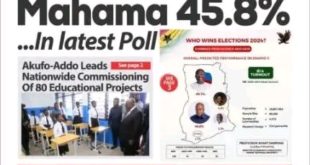Deputy Minister of Finance, and Member of Parliament for Ejisu, John Ampontuah Kumah has expressed surprise at the double standards the National Democratic Congress (NDC) is displaying in the reversal of benchmark values on selected imported products by the Government.
The National Democratic Congress (NDC) on Wednesday held a press conference to chide the ruling NPP government for reversing a benchmark value rebate policy implemented in 2019.
This comes after the government, through the Ghana Revenue Authority (GRA) announced that effective Tuesday, January 4, 2022, Benchmark values will be reversed for some 43 selected items.
Reacting to the NDC presser, John Kumah says the act by the NDC is only meant to deceive Ghanaians as if they were those who cared for them.
According to the Deputy Minister, in 2019 when the government imposed the benchmark on these products the NDC were same who criticized the NPP for that.
Surprisingly, the Minister says they are the same speaking against the reversal of the same policy they spoke in favor of in 2019.
Below is John Kumah full statement:
The National Democratic Congress (NDC) recently held a press conference to chide the government for reversing a benchmark value rebate policy implemented in 2019. Government discounted the benchmark value for selected imported general goods by 50%; whiles imported vehicles were discounted by 30%. The idea then was to enhance the competitiveness of Ghana ports in the West African region as the many flagships under the National Industrial Revitalisation Programme took shape. In line with the 2022 budget statement, this policy has been reversed effective 4th January 2022.
However, according to the NDC, the benchmark value discount reversal policy, in their words, is “draconian” and reflect the “insensitivity” of the Akufo-Addo/Bawumia government to the plight of Ghanaians.
The views, as expressed by the NDC, are regrettable and pedestrian. Perhaps, if the NDC had done a little research, it would have unearthed the countless benefits that government and local businesses would accrue for reversing this policy. Moreover, the thrust of NDC’s presser appears shallow, ill-informed, and inconsistent with its 2020 Manifesto “Edwuma Pa Plan”, where they promised to prioritise local production for rapid industrialisation, job creation and entrepreneurship.
It is also important to state that the benchmark value discount policy of 50% on selected imported general goods and 30% on imported vehicles is the creation of the NPP government and not the NDC. Isn’t it strange that the NDC party, who in their 8-years in power, never saw the need for such a policy to suddenly emerge as defenders of the policy? Why didn’t the NDC government, when the Country was ensnared with Dumsor, implement a benchmark value policy to cushion Ghanaians and importers? Does the NDC appreciate the rationale for the policy in the first place? Certainty, gauging from their presser, one will not be wrong to suggest the NDC does not appreciate the dynamics of economic management. Under the NDC’s reign, local production received very little attention, exacerbating the Country’s dependence on imported products. Yet, they were so insensitive that it never bordered to reduce taxes and charges at the ports to ease the burden of suffering Ghanaians at the time.
Throughout Ghana’s history, various governments have strived to promote local production and have implemented policies to reduce the Country’s dependence on foreign economies. The policy of import-substitution is one classic example. The FX cost to government for the importation of some goods which can be produced locally is something all political actors should be concerned about. The NPP government has shown clearly that its priority is to support local businesses to be able to produce many of these products and ultimately reduce the FX burden occasioned by the huge imports.
Response to the fallacies of the NDC on the economy.
Though this statement is not intended to respond to the many factual inaccuracies of the NDC in their presser, it is important not to overlook them. Indeed, the sterling performance of the Nana Akufo-Addo/Bawumia government is there for all to see. The strong rebound in growth which is projected at 4.9% for 2021, is a testament to the marvellous job the NPP has done since assuming office, albeit the blips brought by COVID-19.
The fallacy of the NDC on the cedi’s strength is laughable. The pace of depreciation of the cedi against the major trading currencies during the era of the NDC were in their high twenties. Today, the cedi’s depreciation rate against the dollar has slowed to 3.63% as at the end December 2021. The cedi in February 2020 was ranked the best performing currency in the world. This significant milestone was achieved under the NPP.
The NDC also lamented the “alarming rate of increase in world commodity prices.” Clearly, the NDC does not understand the dynamics of the international commodity market and how such developments there bodes or affect the Ghanaian economy. Few insights might help our brothers and sisters of the NDC. Global developments are often not within the control of governments. Governments who are price-takers only mitigate the effects of external headwinds on their domestic economies. For Ghana, three commodities impact the Country: gold, oil and cocoa. Gold prices for the better part of 2021 were fairly stable, averaging US$1,790.69 per ounce. The increases in the price of gold bode well for the economy. For crude oil, because Ghana is a net importer, developments there have a double-tail effect on the economy. Even with oil, following the initial sustained rise for most of 2021, it peaked in October 2021 and subsequently plummeted. The development has varied implications for budget and pump prices. For cocoa, increases in the price of the beans bode well for the economy. Cocoa prices have been largely stable for 2021 with minimal swings.
The NDC’s creation of “excessive taxation” and “persistent increases in fuel prices” to a large extent exemplify their propagandist orientation. Ghanaians know that this government took down many of the nuisance taxes that the NDC introduced. Through the digitalisation drive, the government is improving revenue mobilisation by broadening the tax base to capture those who hitherto avoided taxes. The e-levy remains the only tax government introduced in the 2022 budget. On the notion of persistent fuel price increases, it is again not grounded on data. Though the fuel market is a deregulated one, government have at all the time abated the full impact of global crude oil prices changes at the pump. The recent one is the suspension of the price stabilisation and recovery levies on petrol, diesel, and LPG from November 2021 to January 2022.
Industrialisation agenda of Government
It is undeniable that the Nana Akufo-Addo government in the past 5-year have worked tirelessly to anchor economic growth and progress on local production. A comprehensive and wide-ranging Industrial Transformation Programmes geared towards making Ghana the new manufacturing hub in West Africa and Africa has been implemented. The specific areas of this grand programme include the National Industrial Revitalisation Programme, which aims to provide a stimulus package to commercially viable but financially distressed companies. The next component is the One District One Factory (1D1F) which is also geared towards decentralising industrial development in Ghana. The Strategic Anchor Industries is the next. This is intended to position Ghana’s industrial landscaping around specific industrial patterns and products (Agro-processing, pharmaceutical industry, Integrated Aluminium Industry, Iron and Steel Industry, Automobile and Vehicle Assembly, Textiles, Garments and Apparel sector, Industrial Salt, Petrochemicals, Manufacturing of Machines and Machinery Components, Industrial Starch and Oil Palm Industry).
The rests are the Industrial parks and special economic zones that facilitate land acquisition to set up industrial parks across the Country. These parks will be Free Zone enclaves with access to reliable utilities. The development of small and medium-scale enterprises (SMEs) component aimed at supporting small and medium-scale enterprises to effectively contribute towards industrial development and job creation. Furthermore, export development programme also aims to encourage and facilitate businesses to take advantage of AfCFTA, AGOA and the EPA. The enhancing domestic retail infrastructure programme also adds value to locally manufactured products to make them competitive with other products from elsewhere. The Business Regulatory Reforms, Industrial sub-contracting exchange is intended to link SMEs to large companies in the Country to ensure that they subcontract some of their businesses to the SMEs and improve Public-Private sector Dialogue.
Through these interventions, various support schemes have been extended to the business community to stimulate their creativity and allow them to expand and grow. As a result, many moribund businesses have been resuscitated, including the famous Darko Farms. The capacity of these local businesses to meet the Country’s demands is not in doubt. Many of them have expanded quickly through government support and are competing with other companies elsewhere in the export market. The reversal of the benchmark values policy will be a good enabler for their further growth and the consumption of local products. In addition, the “Buy Made in Ghana” campaign will help increase local products’ consumption. The shift from importing foreign goods to local production and consumption will be good for the economy.
In the automobile sector, the achievements of Nana Akufo-Addo’s government is unmatched. Through the Strategic Anchor Industries programme, the government has attracted considerable interest from world-acclaimed automobile companies to establish and currently operating assembly lines in Ghana. Volkswagen (VW), the German carmaker, Sinotruck, Toyota, and Nissan are all at various automobile assembly stages in Ghana. Local manufacturing companies like Kantanka have not been left out of government assistance. Currently, government institutions procure most of their vehicles from domestic carmakers or local car assembling companies. To sustain such a noble achievement, it will be policy inconsistent for the government to rebate taxes on imported cars if growing local manufacturing is government’s priority. The climate gains from this policy cannot be lost since purchasing locally manufactured or assembled brand-new cars is pollution efficient compared with second-hand imported vehicles.
Conclusion: It is important to reiterate that the government is focused on building the Ghanaian economy, emphasising local production in line with the Ghana Beyond Aid Strategy. In this regard, deliberate policies which encourage citizens to expand their entrepreneurial prowess will be supported. Government will grow local businesses to create jobs and accelerate our economic emancipation. Government will choose domestication ahead of any policy dogma that increases our dependence on foreign goods. Indeed, the government is firmly convinced that our local businesses can meet domestic demand and even support other countries through the various trade pacts Ghana has signed on.
Source: dailyguidenetwork.com


Send your news stories to myghanamedia@gmail.com and Chat with us via WhatsApp on +233 200818719
 MYGHANAMEDIA.COM Best Source Of Latest News
MYGHANAMEDIA.COM Best Source Of Latest News





